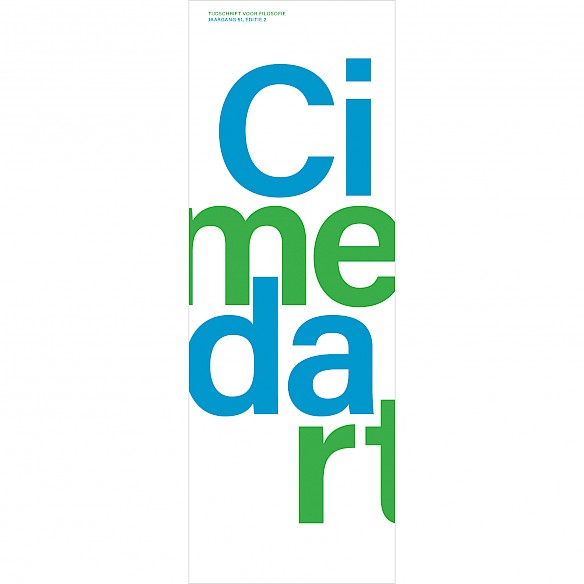Loki's game
Sybolt Doorn
Recently my family befriended a dog. Actually, befriending
would be the wrong word, since the beast was bought, as
usual, at a young age, and so in common tongue we speak of
ownership. In this sense some might call it slavery, yet to me,
beside the implicit absence of choice, we speak of a family
relation, although maybe of a Stockholm syndrome kind. To
justify this hostage situation, or what might be perceived as
such, we could say that, to some extent, it is applicable to all
kinds of relationships; even those between parent and child.
Loki, as friend, slave, sibling, now plays a part in my life. This
relation is of a symmetric kind; I, too, play a part in hers, and
now together we play. From this a universal connection to all
beings one meets can be framed. Yet, Loki’s connection to
me is different from any other, like any other is different from
ours. I’m fond of dogs in general, but I’m specifically fond of
my dog. This connection, moreover, also expresses itself in
the energy I share with her.
What makes the relation between Loki and myself of any
interest, then? Well, to be straightforward and bold: I believe
the connection is philosophically interesting because Loki
and I engage in the concept of deterritorialization. This
concept is mainly used in geophilosophy as a way to understand
reality. It takes on different shapes depending on the
context in which it is found. Still, deterritorialization always
comes down to the abstract idea of things moving away
from a territory.
Now, the word territory might sound primal. Like the territory
where one is king, where one lives, where one hunts, or
where one reigns sovereign. Those characteristics are fun,
but still do not touch upon all the possible manifestations
of the concept. Deterritorialization, to be understood well,
extends the conventional scheme of predator and prey. In
those terms we usually think of animals that hunt or flee. Yet,
in deterritorialization we do not need to speak of animals,
we do not even need to speak of material things. Territory
does not necessarily refer to the material plane, but can be
extended to refer to the mind, where ideas can infiltrate.
The territory of the mind unveils an extreme difference to
itself in all its plurality. In contrast to the common material
plane, there is never ‘the common mind’. When we try to
explain the mind we fall into metaphor, but the experiences
that take place therein cannot be deduced to a generality. It
would be absurd to seek its true properties since they vary from
individual to individual. Every single person understands, roams
and is (un)aware of this realm – through this realm – in their own way.
When I mentioned deterritorialization, I meant exactly this:
wandering so far away from our own mental territory that we
reach a place undiscovered. The territory changes into a new
attitude, idea, personality or behaviour. And since the mental
is no actual landscape, but rather a shape, a way of perceiving,
the change in territory alters the way surroundings are
perceived, which in turn could generate an ever-widening
territory (unless followed by an occasional deterritorialization).
We, my dear players, we partake in our own subordination
to our ever-growing empire. We could be paintings,
songs and noises, if only the obstacles and restrictions
wouldn’t be so insurmountable.
So, what then, is Loki’s game? Loki’s game is the arena, the
environment created by my dog. The mutual becoming, the
turning-into-dog and turning-into-man that she realizes.
My dog, Loki, master trickster, Joker, destroyer of worlds,
molester of the fragile skin on human arms, catcher of sticks
and mutilator of bathroom floors. With her I play a constant
game, in which the land from which I came wishes to lure
her in – sit, give paw, lay down, roll over and, of course, play
dead – and while that land is vast, she makes me move
away from it faster than it expands. She does not bow to my
oppression, she moves beyond my commands, my language.
Sometimes she is even more human than me, like how she
does not beg when I eat with others, but rather sits on the
fifth chair at the dining table, listening more carefully than
any of us humans can.
Loki’s game takes place over the course of three minigames.
Let’s not talk about the (quite uninteresting) fetch
game – although I do hold high suspicion she acts as if she
is fond of the ball only because she thinks I like to throw it.
More fascinating are tug-of-war and puppy play. In the first,
by far my favorite, my dog holds the rope on one end, and
I on the other, then both of us pull. Loki, then, as trickster,
makes grunting sounds, her tongue rRrRrattles, snake-like
and surely there is a faint growl. And what do I do? I need to
understand that moment. As Loki pulls the man-made rope, I
growl like a dog. All of this moves into the manic, the hysterical,
the non-human.
This extrapolates when we puppy play. She runs away with
an item and away she runs. And there I go, I hunt, within our
little territory. Fast she is, I must admit, and only with wit can
I catch her. But I do not want to do so, and thus, we play. To
make it work I put my hands on the floor and crawl on all
fours. I bark, I growl, I grunt, I bark once more, and so does
the little trickster, knowing fully well we deterritorialized,
away from our territories, a classic move from where she
came, the echo of that ancestral place, and so we merge in a
deterritorialized segment, playing Loki’s game.
